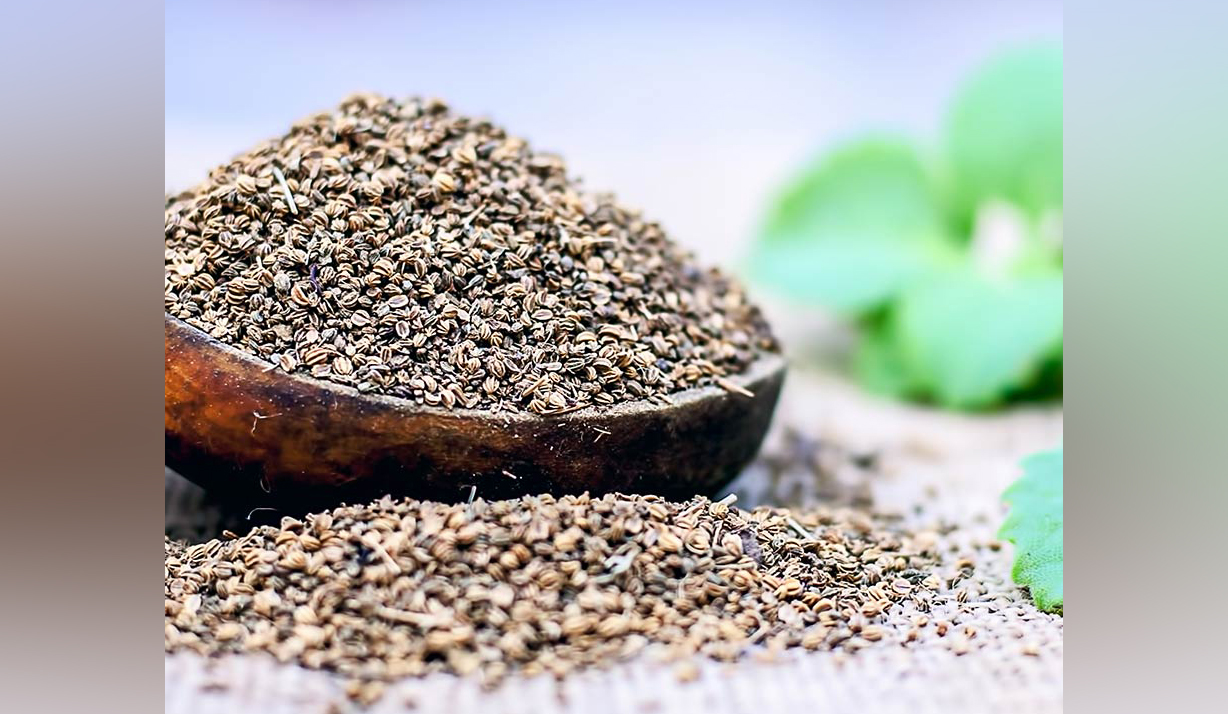Dr Vikas Sharma, Risha Bharti
Trachyspermum ammi (ajwain) is an annual herbal plant belonging to the highly valued medicinally important family, Apiaceae.
Clad by other names such as ajowan, caraway, bishops weed or carom seeds, it is widely used in Indian cuisine. Ajwain is a small, oval-shaped seed-like fruit similar to the seeds of cumin and fennel, exhibiting pungent and bitter taste. It has an aroma close to thyme as it contains thymol. Ajwain originated in the Middle East, possibly in Egypt. It is now primarily grown and used in the Indian Subcontinent, but also in Iran, Egypt and Afghanistan. In India, the major Ajwain producing states are Rajasthan and Gujarat, where Rajasthan produces about 90% of India’s total production. Ajwain is a very old and well known Ayurvedic spice and is one of the useful spices in our kitchen. It is used for flavoring pickles, seasoning chicken and fishes along with other spices. It is also used for making herbal tea. It is used in flavoring snacks, biscuits, sauces, soups and also as mouth freshener. Ajwain oil is used in various cosmetics and pharmaceuticals. Apart from adding flavours to our dishes, ajwain serves several other health benefits. A number of chemical constituents have been reported for the herb. Main constituents include an essential oil called thymol. There is also pinene, p-cymene, limonene and terpinene found in the seed. Ajwain seeds consist of fiber (11.9%), carbohydrates (24.6%), tannins, glycosides, moisture (8.9%), protein (17.1%), fat (21.1%), saponins, flavones and other components (7.1%) involving calcium, phosphorous, iron, cobalt, copper, iodine, manganese, thiamine, riboflavin and nicotinic acid. The host of plant compounds in ajwain offers numerous health benefits and promotes overall well-being and health.
Healing Health Perks of Ajwain
Combats infection: The potential antibacterial and antifungal properties of ajwain are attributed to the goodness of active compounds thymol and carvacrol which impede the growth of harmful bacteria and fungi. Several studies have revealed that ajwain seeds are potent to battle against bacteria like E. coli and Salmonella that causes food poisoning and other gastrointestinal conditions. Furthermore, it acts as potent fungicide and germicide. When crushed and applied topically, it heals the infections and treats wounds.
Improves digestive health: Ajwain is one of the key ingredients used in Indian cooking due to its amazing gut healing properties. It holds a prominent place in treating various digestive conditions like acidity, indigestion and flatulence. Ajwain has thymol content which acts as instant relief from acidity and indigestion. The enzymes in ajwain facilitate the release of gastric juices, thus improving the digestive functions. Ajwain if taken with the small quantity of salt and warm water solves indigestion problems. Moreover, carom seeds extract is used to heal the sores of the esophagus, stomach and intestine and treats peptic ulcers.
Regulates blood pressure: Uncontrolled blood pressure is a major risk factor for heart disease and stroke. Ajwain is used in traditional medicine for controlling high blood pressure. Thymol in ajwain works as an effective calcium channel blocker. This averts calcium from entering blood vessels of the heart which relaxes and expands blood vessels thereby lowering blood pressure. According to Ayurveda ajwain exhibits antihypertensive properties that work well to control high blood pressure symptoms.
Provides relief from cold, cough and asthma: Studies reveal that carom seeds work as an effective anti coughing agent and provides instant relief from cough by enhancing the airflow to the lungs. Ajwain has the anti-bacterial, anti-fungal and sedative properties and clears the nasal blockage by discharging the mucus easily. Intake of ajwain seeds in recommended dosages helps cure migraine headache, cold and cough. Inhaling the ajwain smoke acts as a bronchodilator which aids in asthma treatment.
Ajwain Water: Ajwain or Oma water is an excellent Ayurvedic remedy that helps in curing problems of indigestion for pregnant women by cleaning the uterus and that eases irregular period’s problem in women. Oma water is a traditional remedy given to babies to cure indigestion and flatulence. Drinking this water regularly is well-known to boost metabolism, burns fat and aids in losing weight.
Relief from arthritis / rheumatic pain: The kitchen ingredient has potent anti-inflammatory, anesthetic and antibiotic properties, which is extremely beneficial in reducing redness and combat inflammation and give relief from pain and swelling, thereby reducing the chances of chronic autoimmune inflammatory diseases like rheumatoid arthritis.
Enhances Skin Health: Blessed with anti-inflammatory and curative properties, ajwain is used for treating oxidative free radical damage due to the sun rays, and hence treats the various signs of aging like wrinkles, fine line, spots, dark circles, etc. It is also extremely beneficial for lightening scars due to acne, pimples and bestows a smooth and glowing skin.
Arrests premature greying of hair: The active constituents in ajwain are extremely beneficial in maintaining the natural colour of hair and prevent further greying. Owing to its anti-microbial nature, it also treats various scalp and hair infections like folliculitis, itching and dandruff. It also nourishes the hair follicles with essential nutrients, promotes blood circulation and strengthens the hair strands from the roots.
Relief from ear / toothache & treat pain of kidney disorders: Ajwain oil also gives relief from earaches and gargle with ajwain combined with salt / lukewarm water gives relief from toothache. Ajwain, when mixed with honey and vinegar and used, dissolves kidney stones that ultimately remove with urine.
Helps in reducing weight: The appetite stimulating properties and the laxative components of Ajwain fastens the bowel movement thus helping in weight loss.
Side-Effects of Ajwain
Ajwain generally do not cause any side effects when consumed in moderate amounts, but over-consumption may lead to several adverse effects, such as; it may cause stomach ulcer and heartburns, leads to dizziness and nausea, increases liver problems, causes heart diseases, it increases the body temperature, thus, causing several problems during pregnancy, it may also cause photosensitivity.
Trending Now
E-Paper


